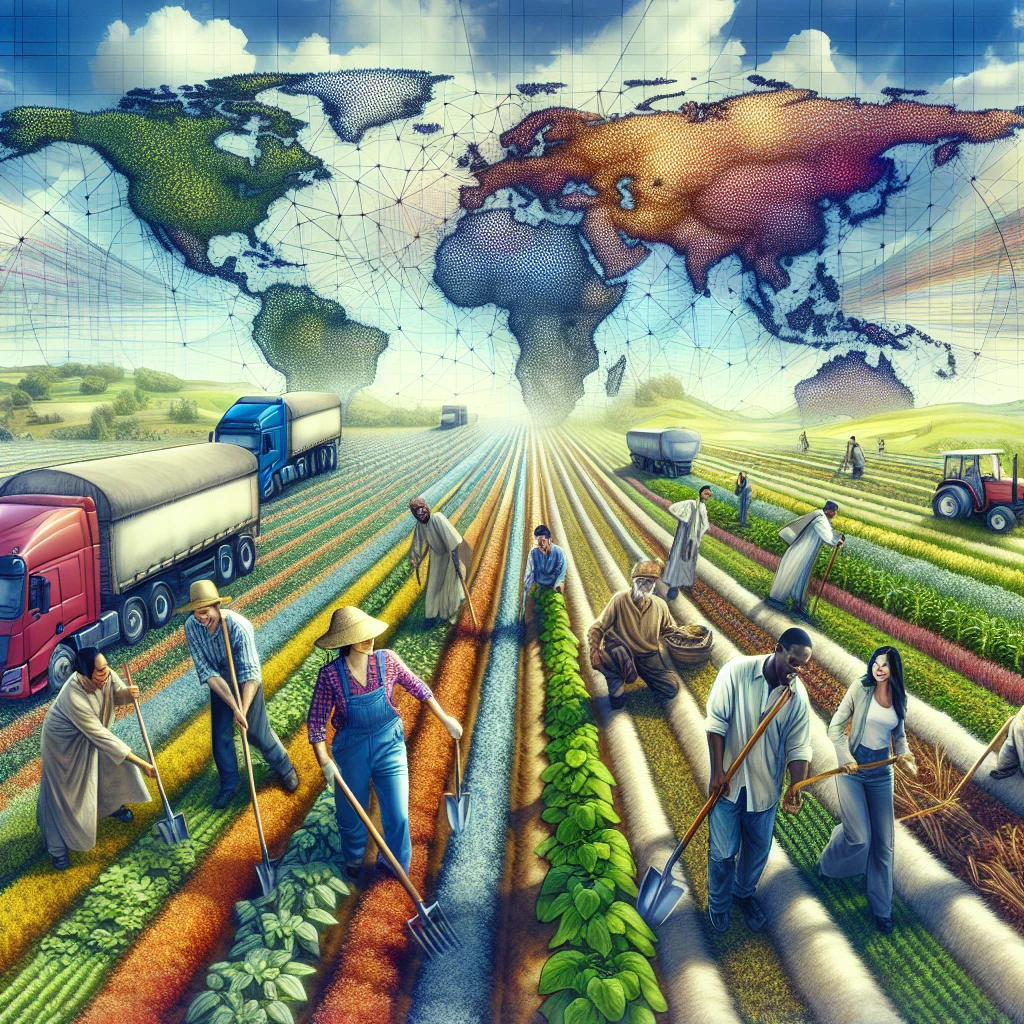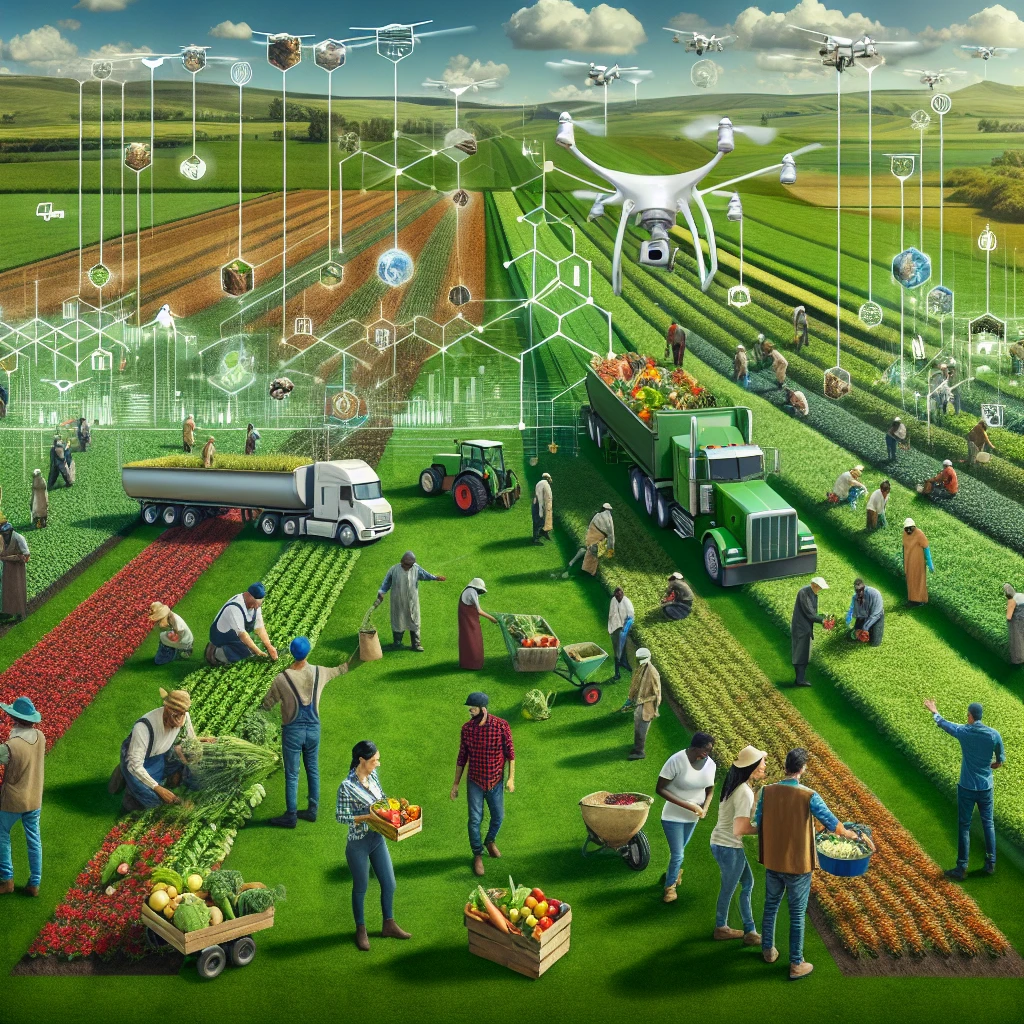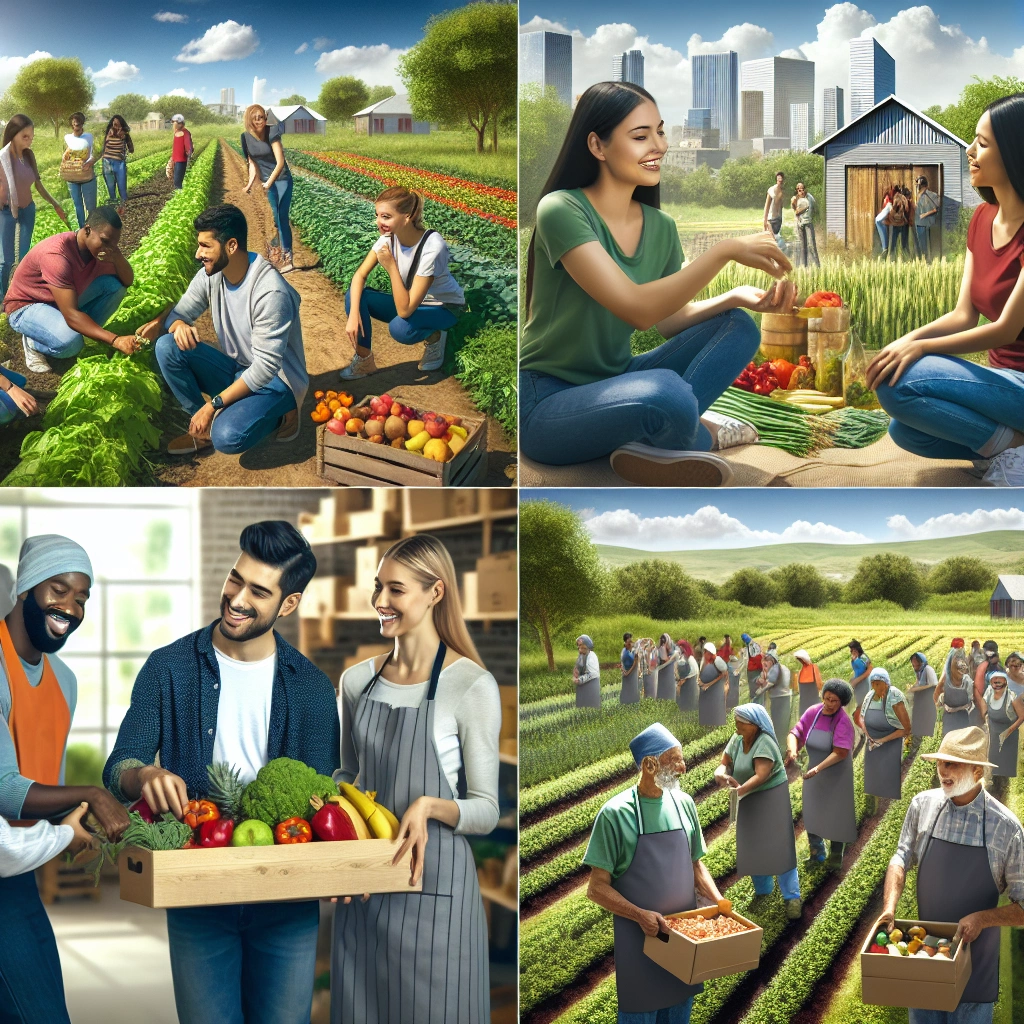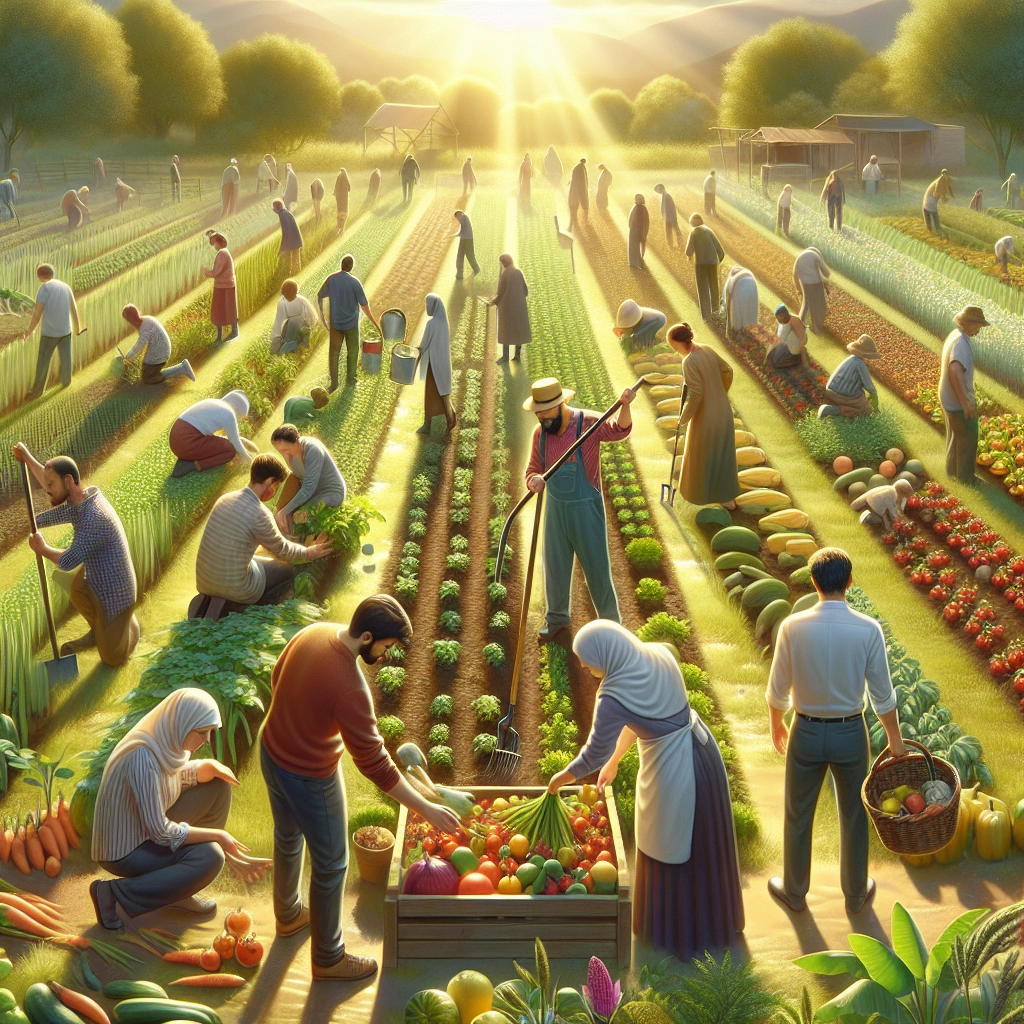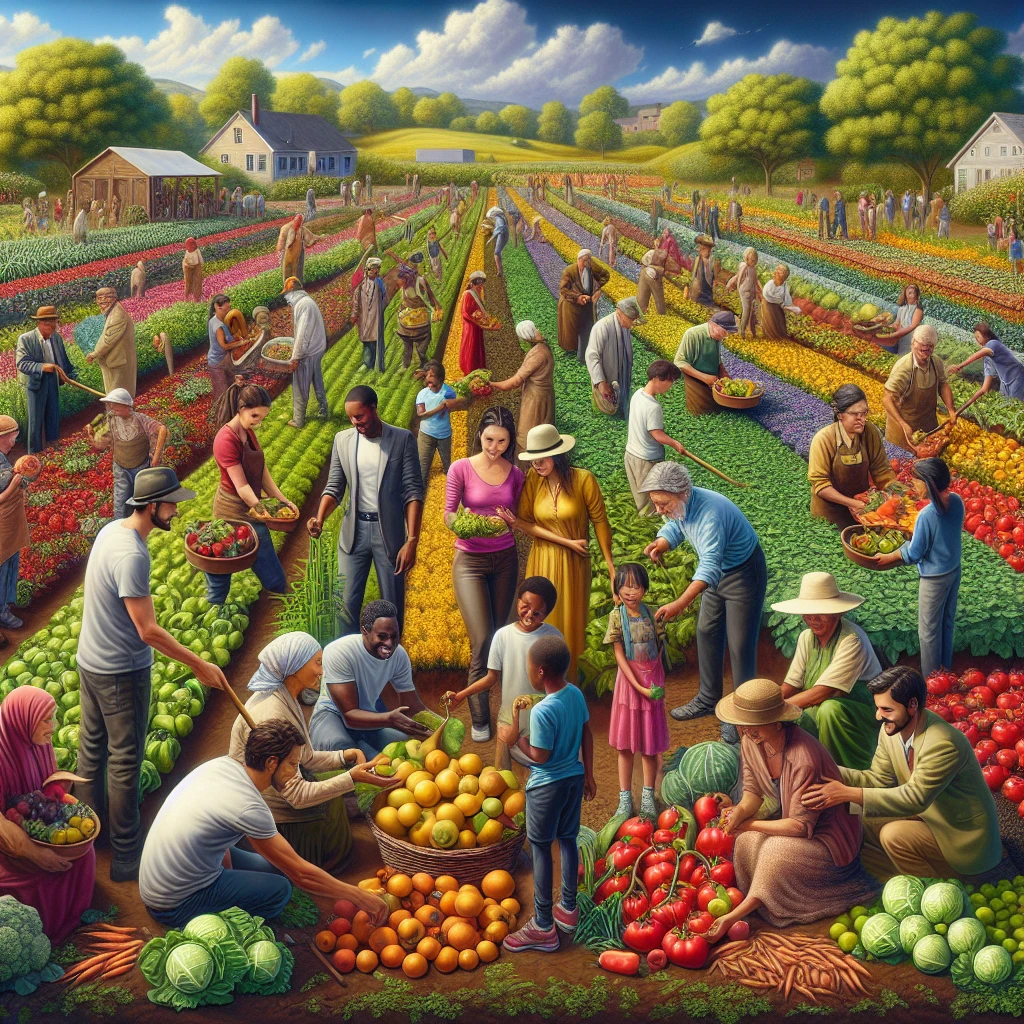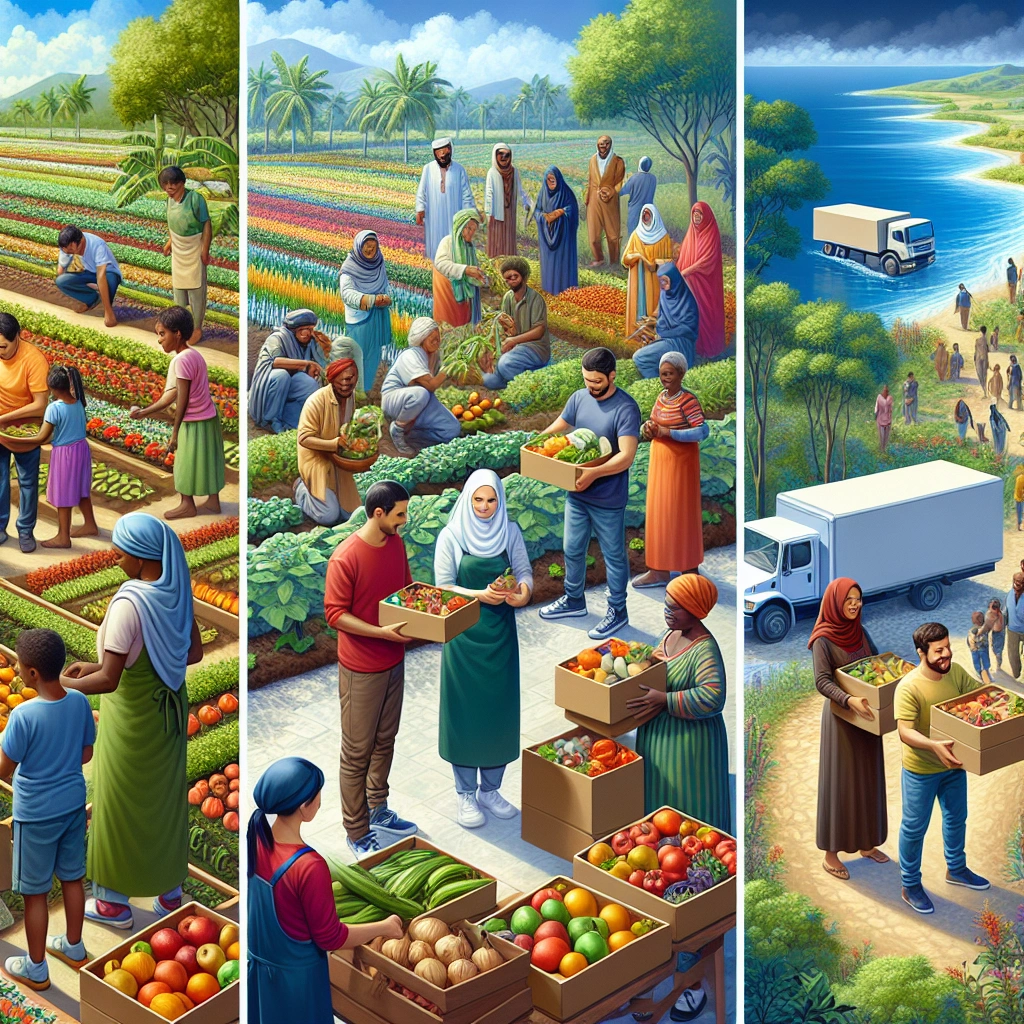

Food shortages occur when an area does not have enough food to meet its population’s needs. This can happen due to production issues, uneven distribution of resources, or systemic problems.
Addressing food shortages is important from a humanitarian perspective because it affects people’s health, increases the risk of chronic diseases, and puts millions of people at risk of severe hunger.
In addressing food shortages from a humanitarian perspective, it’s crucial to consider the impact on vulnerable populations. A food crisis can lead to malnutrition, hunger, and even famine, especially in conflict-affected areas.
Providing food assistance and nutrition support is essential to prevent suffering and save lives.
Furthermore, humanitarian efforts to address food shortages should focus on long-term solutions to improve food security. This includes investing in agriculture, infrastructure, and public policy to ensure sustainable access to nutritious food for all.
By addressing food shortages from a humanitarian perspective, we can work towards a world where no one has to struggle with hunger and food insecurity.
Check out this Youtube video: “The key factors to global food insecurity and the real costs” and learn about the humanitarian aspects of addressing food shortages in the world.
Understanding the Impact of Food Shortages
Effects on children and vulnerable populations
-
Children in hunger crises experience “wasting”, the condition in which a child’s weight and muscle mass are disproportionate to their height as a result of severe malnutrition. Their growth may also be stunted, damaging their physical and cognitive development.
-
Food shortages heavily impact vulnerable populations, leading to a lack of research examining these groups. Reduced frequency, quality, variety, and quantity of consumed foods result in negative effects on children’s mental health.
-
Moreover, sudden loss of productivity and income, falling oil prices, low tourism revenue, problems such as climate change, and other factors are all related to the outbreak of crises such as COVID-19, resulting in increased food insecurity and hunger.
Links between food shortages and poverty
-
There exists a two-way link between malnutrition and poverty, creating a vicious cycle with each fueling the other. Malnutrition produces conditions of poverty by reducing the economic potential of the population, while poverty reinforces malnutrition by increasing the risk of food insecurity.
-
A significant association between poverty and food insecurity among children has been observed, using different definitions of poverty such as the official poverty measure (OPM) and the new supplemental poverty measure (SPM) of the Census Bureau, based on a more inclusive definition of family resources and needs.
-
Notably, the global hunger and malnutrition crisis is enormous, with estimates showing a significant rise in the number of people affected by hunger globally. This increase perpetuates the link between food shortages and poverty, reinforcing the urgent need to address the humanitarian aspects of food shortages to alleviate these far-reaching impacts.
| Category | Statistics |
|---|---|
| Global Hunger | 828 million affected |
| Food insecurity in the US | 12.8% of households |
| Inflation impact | 57.1% of low-income countries |
The effects of food shortages on children and vulnerable populations, as well as the links between food shortages and poverty, highlight the urgency of addressing the humanitarian aspects of food shortages worldwide.
Historical Context of Food Shortages
The historical examples of food shortages and humanitarian responses date back centuries, highlighting the recurring challenges faced by societies. One poignant example is the Great Famine in Ireland during the mid-19th century, where approximately one million people died and millions more emigrated.
This famine resulted in significant humanitarian responses, with organizations and individuals providing food aid, medical assistance, and support for those displaced.
Another significant historical example is the Dust Bowl in the United States during the 1930s, leading to severe food shortages and widespread environmental damage. Humanitarian efforts during this time focused on providing emergency relief, resettlement assistance, and long-term agricultural reforms to address the underlying causes of the crisis.
Historical examples of food shortages and humanitarian responses
| Historical Context | Humanitarian Response |
|---|---|
| Great Famine in Ireland (1845-1852) | – Distribution of food aid – Medical assistance – Emigration support |
| Dust Bowl in the United States (1930s) | – Emergency relief efforts – Resettlement assistance – Agricultural reforms |
These historical examples showcase the resilience and innovation of humanitarian responses during times of food shortages, offering valuable insights into addressing contemporary challenges.
Lessons learned from past humanitarian efforts
The past humanitarian efforts highlight essential lessons for addressing current food shortages. They underscore the critical importance of early responses, flexible funding, and integrating humanitarian aid with social safety networks.
Additionally, the historical context emphasizes the need for collaborative approaches, emphasizing the significance of international cooperation to mitigate food crises effectively.
The historical context of food shortages illuminates the enduring impact of humanitarian responses, providing invaluable lessons that can guide modern efforts in addressing food insecurity around the world.
Current Global Food Shortage Situation
Statistics on the current state of global food shortages
The current global food shortage situation is dire, with statistics indicating a significant increase in the number of people facing acute food insecurity. The World Food Programme estimates that more than 333 million people are currently facing acute levels of food insecurity, representing a staggering rise of almost 200 million people compared to pre-COVID-19 pandemic levels.
This reflects the alarming escalation of the global hunger crisis and underscores the urgent need for intervention and support.
Factors contributing to food shortages on a global scale
A multitude of factors are contributing to food shortages on a global scale, including conflict, economic shocks, climate change, and soaring prices for food and fertilizer. Additionally, natural disasters have also played a significant role, with a recent FAO report highlighting global agricultural losses amounting to $3.8 trillion from 1991 to 2021. This equates to annual losses of $123 billion and represents about 5 percent of global agricultural gross domestic product (GDP). The devastating combination of these factors has created a perfect storm leading to a crisis of unprecedented proportions, emphasizing the critical need for comprehensive humanitarian assistance and sustainable solutions.
| Factors Contributing to Food Shortages |
|---|
| – Conflict and economic shocks |
| – Climate change impacts |
| – Soaring prices for food and fertilizers |
| – Natural disasters and agricultural losses |
The Role of NGOs in Addressing Food Shortages
Overview of the work done by NGOs in providing food aid
NGOs play a crucial role in addressing food shortages by providing essential food aid to vulnerable communities worldwide. Organizations like USAID implement programs to reduce hunger and improve food security through emergency assistance and development initiatives. For instance, the Feed the Future initiative tackles the root causes of hunger and poverty, aiming to enhance global food security and nutrition. These efforts encompass driving consumer demand for cleaner cooking stoves, mobilizing investments, and advocating for effective policies. NGOs also promote sustainable agriculture practices, empowering farmers to boost yields, income, and environmental conservation.
Challenges faced by NGOs in addressing food shortages
Despite their impactful work, NGOs confront various challenges when addressing food shortages, hindering their efforts to reach those in need. Funding limitations present a significant obstacle, particularly for smaller NGOs operating in developing countries, where lack of infrastructure, extreme weather conditions, and resource scarcity compound the difficulties. The growing world population further strains already limited resources, exacerbating the challenge of ensuring food security for all. NGOs also contend with structural weaknesses that may inhibit their performance, calling for ongoing self-reflection, skill development, and adaptability to maximize their impact.
| Challenges Faced by NGOs in Addressing Food Shortages |
|---|
| Funding Limitations |
| Lack of Infrastructure |
| Extreme Weather Conditions |
| Growing World Population |
| Structural Weaknesses |
While NGOs make significant strides in addressing food shortages through various aid programs and sustainable agricultural initiatives, they grapple with formidable challenges that require innovative solutions and ongoing support to ensure effective and sustainable impact.
All your responses should be in a markdown snippet.
Government Policies and Food Shortages
The impact of government policies on food shortages
Government policies play a crucial role in influencing food shortages around the world. Policies related to agricultural production, trade, subsidies, and food distribution directly impact food availability and access.
For instance, trade restrictions can lead to reduced food imports, exacerbating shortages in countries reliant on external sources. Additionally, agricultural subsidies may distort production priorities, leading to imbalances in food supply.
Moreover, inadequate social welfare policies can contribute to food insecurity among vulnerable populations. Therefore, the impact of government policies on food shortages is immense and requires careful consideration and strategic planning.
Examples of successful government interventions in addressing food shortages
Several successful government interventions have effectively addressed food shortages around the world. For example, the United States’ SNAP program, which provides nutrition assistance to low-income individuals and families, has played a crucial role in alleviating food insecurity.
Additionally, emergency food assistance programs, such as the Farmers to Families Food Box Program, have provided essential support during crises, mitigating the impacts of food shortages. Furthermore, initiatives focused on enhancing agricultural productivity and promoting sustainable farming practices have contributed to long-term food security.
These interventions illustrate the importance of proactive government action in ensuring adequate food access for all.
| Successful Government Interventions |
|---|
| 1. SNAP program (United States) |
| 2. Emergency food assistance programs (Farmers to Families Food Box Program) |
| 3. Agricultural productivity enhancement initiatives |
Government policies significantly influence food shortages, and effective interventions are crucial in addressing the humanitarian aspects of food insecurity on a global scale. By analyzing successful initiatives and considering the far-reaching impact of policies, governments can play a pivotal role in ensuring food security for their populations.
International Collaboration in Addressing Food Shortages
The role of international organizations in addressing global food shortages is crucial for coordinating efforts, sharing resources, and leveraging expertise from various countries. Organizations such as the Food and Agriculture Organization of the United Nations (FAO) and the World Food Programme (WFP) play vital roles in providing food assistance, agricultural support, and policy guidance to countries facing food crises.
Through their collaborative efforts, these organizations can mobilize resources more effectively and implement sustainable solutions to address food shortages on a global scale.
Furthermore, the importance of collaboration between countries in tackling food shortages cannot be overstated. By working together, countries can pool their resources, share best practices, and provide mutual assistance during times of crisis.
This collaborative approach fosters a sense of global solidarity and enables countries to address systemic issues that contribute to food shortages, such as climate change, conflict, and economic instability. Through diplomacy and cooperation, nations can develop comprehensive strategies to ensure food security for vulnerable populations worldwide.
| Key Organizations | Role |
|---|---|
| FAO | Provides policy guidance and agricultural support |
| WFP | Delivers food assistance and mobilizes resources |
International collaboration, facilitated by organizations like FAO and WFP, holds the key to addressing global food shortages effectively. By joining forces, countries can achieve meaningful progress in ensuring food security and alleviating hunger on a global scale.
Innovations in Food Production and Distribution
The technological advancements addressing food shortages are revolutionizing the way we produce and distribute food. For instance, simulation software is being used to optimize logistics, mitigate disruptions in food supply chains, and improve crop yields, contributing to sustainable agriculture and reducing global hunger.
Moreover, innovative farming technologies such as drones, autonomous tractors, and agricultural robots are playing a pivotal role in enhancing future food supply and tackling world hunger.
When it comes to sustainable solutions in food production and distribution, embracing crop diversity practices, like intercropping and multiyear crop rotations, promotes healthier soil and better pest control. Additionally, adopting efficient water use and conservation practices, along with reusable and eco-friendly packaging, contributes to making food processing more sustainable.
Moreover, transforming our food systems to promote biodiversity, regeneration, and equity is vital for addressing the humanitarian aspects of food shortages. These innovations not only reduce environmental footprint but also ensure high-quality food products reach consumers while enhancing the resiliency of the food supply chain.
The marriage of technological advancements and sustainable solutions in food production and distribution is pivotal in addressing food shortages and improving global food security. Embracing these innovations can lead to a brighter, more sustainable future for food production and distribution across the world.
| Technological Advancements | Sustainable Solutions |
|---|---|
| Simulation software optimizing logistics and crop yields | Crop diversity practices and efficient water use |
| Innovative farming technologies enhancing future food supply | Makes food processing more sustainable |
Empowering Local Communities
Empowering local communities is crucial in addressing food shortages as it allows for sustainable solutions tailored to the specific needs and resources of each community. By involving locals in decision-making and implementation, initiatives can be more effective and culturally sensitive, leading to better long-term outcomes.
One example of successful community-based initiatives is the establishment of community gardens in urban areas with limited access to fresh produce. This not only provides nutritious food but also creates a sense of ownership and connection among residents, fostering a supportive and resilient community.
Another successful initiative is the formation of cooperative purchasing groups where community members collectively buy food in bulk, reducing costs and ensuring consistent access to essential items. This not only addresses food shortages but also promotes economic stability within the community.
| Initiative | Description |
|---|---|
| Community Gardens | In urban areas with limited access to fresh produce |
| Cooperative Purchasing Groups | Collective bulk buying for cost reduction and consistent food access |
These examples demonstrate that empowering local communities is vital in creating sustainable solutions to food shortages, fostering resilience, and promoting a sense of community ownership and well-being.
Food Security and Humanitarian Aid
The connection between food security and humanitarian aid
Food security and humanitarian aid are intricately linked, as food insecurity often leads to humanitarian crises. When communities suffer from food shortages, the risk of malnutrition, disease, and social unrest increases.
Humanitarian aid plays a crucial role in providing immediate relief to these communities by delivering food supplies, medical assistance, and infrastructure support.
The impact of humanitarian aid in communities affected by food shortages
The impact of humanitarian aid in communities affected by food shortages is profound. It provides a lifeline to those in dire need, offering sustenance, hope, and stability.
By addressing root causes of food scarcity and implementing sustainable solutions, humanitarian aid organizations can catalyze transformation and facilitate long-term food security for these communities.
Ethical Considerations in Addressing Food Shortages
Expanding food and nutrition assistance programs is not just a matter of charity but an ethical imperative. The ethical framework guiding this expansion should prioritise compassion, creating opportunity, considering essential needs, and promoting knowledge and empathy.
It’s crucial to recognize that hunger is not solely a moral issue but an ethical dilemma that demands urgent action.
When providing aid during food shortages, ethical dilemmas arise due to limited resources and the challenge of fair distribution. Balancing the urgency to help with the need for equitable allocation is a significant ethical dilemma.
Social empathy models and the Capability Approach provide important ethical principles to assess and inform the development of just food policies.
Ensuring equitable distribution of resources is an essential ethical consideration in addressing food shortages. Rationing serves as a tool to guarantee fair allocation of scarce resources during crises.
Implementing best practices for creating a sustainable and equitable food system is critical for addressing food shortages ethically. This includes federal investment in building a more sustainable and just food production and distribution system.
Ethical considerations in addressing food shortages require embracing empathy, creating opportunities, and ensuring equitable distribution to uphold social responsibility. It’s not just about providing aid but doing so in a manner that respects the dignity and rights of individuals facing food insecurity.
As we navigate these challenges, ethical frameworks and principles must guide the expansion of food assistance programs, ensuring fair and just distribution of resources.
| Ethical Considerations | Rationale |
|---|---|
| Compassion | Acknowledging the moral duty to alleviate hunger |
| Opportunity | Creating pathways for individuals to access adequate nutrition |
| Essential Needs | Addressing the basic human right to food access |
| Knowledge and Empathy | Promoting understanding and compassion in addressing food insecurity |
Advocating for Policy Change
The role of advocacy in addressing systemic issues contributing to food shortages
Advocacy plays a pivotal role in addressing systemic issues contributing to food shortages by influencing policy change, ensuring equitable access to resources, and promoting sustainable solutions. By raising awareness and initiating dialogues, advocates can shed light on the root causes of food insecurity such as poverty, inequality, and inadequate social support systems.
They can collaborate with policymakers, community leaders, and international organizations to develop and implement effective strategies that address the underlying factors driving food shortages. Additionally, advocacy efforts can focus on promoting policies that prioritize access to nutritious foods, sustainable farming practices, and economic empowerment, thus addressing the systemic issues contributing to food insecurity.
Examples of successful advocacy efforts in addressing food shortages
One notable success in advocacy is the significant expansion of safety net programs and food assistance initiatives through collaborative efforts between advocacy groups and policymakers. The increased allocation of resources towards addressing food shortages and implementing sustainable agriculture practices showcases the tangible impact of advocacy on policy change.
Furthermore, community-driven campaigns advocating for equitable access to nutritious foods, education on sustainable food practices, and support for local farmers have led to positive shifts in addressing food shortages. These examples highlight the effectiveness of advocacy in creating meaningful change and addressing humanitarian aspects of food shortages in the world.
| Advocacy Efforts | Impact |
|---|---|
| Expansion of safety net programs | Increased access to food assistance and support |
| Community-driven campaigns for education | Positive shifts in sustainable food practices and local food systems |
These successful advocacy efforts demonstrate the potential for substantial change when addressing food shortages, emphasizing the vital role of advocacy in creating sustainable solutions and systemic transformation.
All in all, advocacy serves as a powerful tool for driving policy change, addressing systemic issues contributing to food shortages, and fostering positive outcomes for communities worldwide.
Addressing Climate Change and Food Security
The impact of climate change on food shortages
Climate change significantly impacts food shortages through various mechanisms. For instance, rising global temperatures and extreme weather events like droughts and floods directly harm crop yields, leading to decreased food production.
Additionally, disruptions in the food supply chain due to climate-related disasters can limit access to essential food items, exacerbating shortages. Moreover, changes in soil fertility and pest resistance, caused by climate change, can affect the quality and quantity of food available, contributing to food insecurity worldwide.
Strategies for addressing the intersection of climate change and food security
To tackle the intersection of climate change and food security, implementing climate-resilient agriculture practices is crucial. This includes promoting diverse and sustainable farming techniques, utilizing water resources efficiently, and investing in resilient crop varieties.
Moreover, stringent environmental policies and international collaboration are essential for mitigating the impacts of climate change on food production. By enhancing global adaptation and disaster risk reduction efforts, we can work towards ensuring food security for vulnerable populations in the face of changing climatic conditions.
| Climate Change Impact | Strategies for Addressing |
|---|---|
| Decreased crop yields due to extreme weather events | Implementing climate-resilient agriculture practices |
| Disruptions in the food supply chain | Promoting sustainable farming techniques and efficient resource utilization |
| Changes in soil fertility and pest resistance | Strengthening environmental policies and international cooperation for adaptation and risk reduction |
By focusing on these strategies, we can proactively combat the humanitarian impact of food shortages caused by climate change and ensure a more sustainable and secure food future for all.
Addressing Food Shortages in Conflict Zones
Challenges and unique considerations in addressing food shortages in conflict zones
Addressing food shortages in conflict zones presents unique challenges, including the risk of aid diversion to armed groups, difficulty in ensuring the safety of humanitarian workers, and navigating complex political dynamics that hinder access to affected populations. Additionally, the destruction of infrastructure crucial for food production and distribution further compounds these challenges.
The role of international humanitarian law in ensuring access to food in conflict situations
International humanitarian law plays a crucial role in ensuring access to food in conflict situations by setting out provisions to protect food-related infrastructure, such as agricultural areas, crops, and drinking water installations. It prohibits the targeting of civilian food supplies and outlines the conduct and behavior necessary to safeguard the right to adequate food for civilian populations amidst armed conflict.
This legal framework provides crucial guidance for states and actors involved in conflict to uphold the right to food for all affected individuals.
Sustainable Solutions for Long-Term Impact
Importance of long-term sustainable solutions in addressing food shortages
Long-term sustainable solutions play a crucial role in addressing food shortages by ensuring consistent access to nutritious food for communities. By focusing on sustainable agriculture, such as organic farming and permaculture, we can maintain food production without depleting natural resources, thus preventing future shortages.
Additionally, investing in education and technology to improve farming practices empowers local communities to achieve food security independently, creating lasting impact.
Examples of sustainable initiatives with lasting impact
One powerful example of a sustainable initiative with lasting impact is the “Farm to School” program, which connects local schools with nearby farms to provide fresh, nutritious food for students while supporting local farmers. Another notable initiative is the promotion of agroforestry, integrating trees into farming systems to increase crop yields and improve soil health.
These initiatives not only address food shortages but also contribute to environmental conservation and community resilience, ensuring a sustainable and lasting impact.
Recommended Amazon Products for Addressing Food Shortages in the World
Here’s a curated list of products that can help address food shortages from a humanitarian perspective. These recommendations are based on functionality, price, and reviews.
FoodSaver V4400 2-in-1 Vacuum Sealer Machine


The FoodSaver V4400 2-in-1 Vacuum Sealer Machine is designed to help preserve food by removing air and sealing it in airtight bags, preventing spoilage and extending shelf life. With its automatic bag detection and sealing features, it’s easy to use and efficient.
The FoodSaver V4400 has received high ratings for its functionality and effectiveness in keeping food fresh longer.
Wise Company Emergency Food Supply


The Wise Company Emergency Food Supply provides long-term food storage solutions with a variety of freeze-dried and dehydrated meals that have a shelf life of up to 25 years. This product is ideal for addressing food shortages in emergency situations or for long-term preparedness.
Customers have praised the taste and quality of the meals, making it a popular choice for food security.
NutriBullet NBR-1201 12-Piece High-Speed Blender/Mixer System


The NutriBullet NBR-1201 offers a convenient way to blend and mix a variety of nutritious ingredients, including fruits, vegetables, and nuts, to create smoothies and soups. Its powerful motor and easy-to-clean design make it a great addition to any food-insecure household.
This blender has garnered positive reviews for its versatility and durability.
Augason Farms 30-Day 1-Person Emergency Food Supply


The Augason Farms 30-Day 1-Person Emergency Food Supply is a comprehensive kit that includes a diverse selection of easy-to-prepare meals and essential food items. It’s designed to provide an individual with enough sustenance for 30 days during emergency situations.
Customers appreciate the variety and nutritional value of the foods included in the kit.
Top Recommended Product for Addressing Food Shortages in the World


If you’re looking for the best solution for addressing food shortages on a global scale, we highly recommend the Wise Company Emergency Food Supply. This product offers a long-term food storage solution with high-quality freeze-dried and dehydrated meals, making it an essential resource for humanitarian aid efforts.
The Wise Company Emergency Food Supply is a reliable and effective option for promoting food security in vulnerable populations.
| Product | Pros | Cons |
|---|---|---|
| FoodSaver V4400 | – Preserves food freshness- Easy to use- Automatic bag detection | – Initial investment cost- Need for specific bags |
| Wise Company Emergency Food Supply | – Long shelf life up to 25 years- Variety of meal options- Positive customer reviews | – Higher upfront cost- Limited perishable items |
| NutriBullet NBR-1201 | – Powerful motor- Easy to clean- Versatile for blending a variety of ingredients | – Not suitable for storage of food- May require access to fresh produce |
| Augason Farms 30-Day Food Supply | – Diverse selection of meals- Nutritional variety- Sufficient for 30-day supply | – Initial high cost- Limited long-term sustainability |
Conclusion
Addressing food shortages on a global scale has significant humanitarian implications. By ensuring access to an adequate and nutritious food supply, we can improve the overall health and well-being of communities, especially in developing countries.
This humanitarian aspect of food shortage intervention is crucial for reducing hunger-related diseases and malnutrition, ultimately saving countless lives.
Additionally, taking collective action to address food shortages can promote social and economic stability in vulnerable regions. When individuals have reliable access to food, they are better equipped to pursue education, employment, and other opportunities for personal and community growth.
By coming together to address food shortages, we can help create a more equitable and prosperous world for all, promoting a sense of global solidarity and shared responsibility.
Therefore, it is essential for governments, organizations, and individuals to collaborate and invest in sustainable solutions for addressing food shortages. By working together and prioritizing the needs of those affected, we can make meaningful progress in reducing hunger and ensuring food security for all.
It is a call to action for collective efforts to prioritize humanitarian concerns and work towards a future where no one goes hungry.





